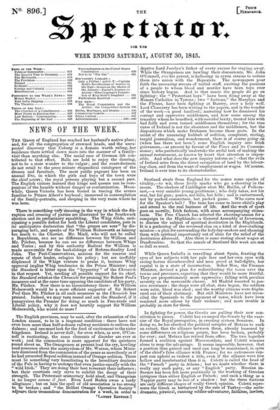The English provinces, may be said, after the exhaustion of
the London season, to be in a stagnant condition : there have not even been more than half-a-dozen railway accidents to enliven the dulness ; and one must look for the food of excitement to the sister kingdoms. Ireland is never dull ; for even when, as now, O'Con- nell is rusticating, the same elements of disorder are ever at work; and the commotion is more apparent for the quietness round about us. The Orangemen at present lead the cry, howling loud nonsense about the martyrdom of Mr. Watson, whom Minis- ters dismissed from the commission of the peace as mercilessly as if he had promoted Repeal sedition instead of Orange sedition. There must be something very humiliating to the hereditary denizens of the Pale in having to undergo that even justice equally with the "wild Irish." They are doing their best to recruit their influence; but their exertions only serve to exhibit the decay of their strength. The Protestant aristocracy hold aloof, and Orangeism is no longer comme it faut. Even Lord Roden owns a tardy allegiance ; but on him the spell of old association is too strong to be broken ; and f0the Belfast Orange Operative Society " adjourn their tremendous demonstration for a week, in order to deprive Lord Jocelyn's father of every excuse for staying away. While the Orangemen are bawling their discontents, Mr. John O'Connell, vice his parent, is hallooing in syren strains to seduce them into union with the Repealers. The newspapers pour forth the unceasing stream of turbid stuff, exciting the passions of a people to whom blood and murder have been toys ever since history began. And to that music the people do go on fighting: the " Protestant boys " have been firing away at the Roman Catholics in Tyrone ; two " factions," the Murphys and the Flynns, have been fighting at Bantry, over a holy well. Lord Cloncurry has been writing to the papers, and is the wonder of the week—a good landlord ; narrating how he dismissed his corrupt and oppressive middlemen, and how some among the tenantry whom he benefited, with suicidal laxity, treated him with bad faith and even turned middlemen themselves ; for the true curse of Ireland is not the absentees and the middlemen, but the dispositions which make Irishmen become those pests. In the midst of the unceasing hubbub of sedition, complaint, rioting, turgid journalism, and wonderment, there is of course going on (when has there not been ?) some English inquiry into Irish grievances,—at present by favour of the Times and its Commis- sioner ; who patriotically undertake the awful task of making the annual restatement, so known by heart that attention is impos- sible. And what does the new inquiry inform us ?—that the evils of Ireland arise from the direct occupation of land by the labour- ing class, and from the want of employment at wages. Of course. Ireland is ever true to its characteristics.


























